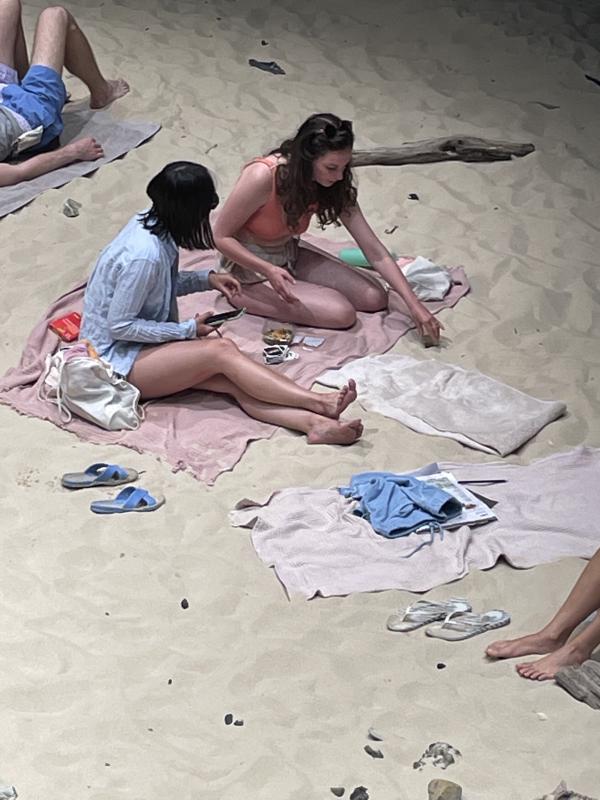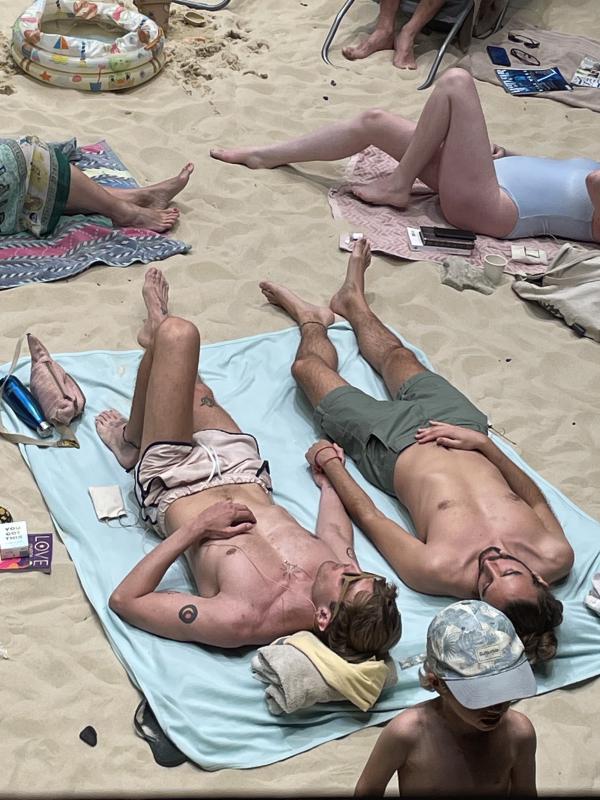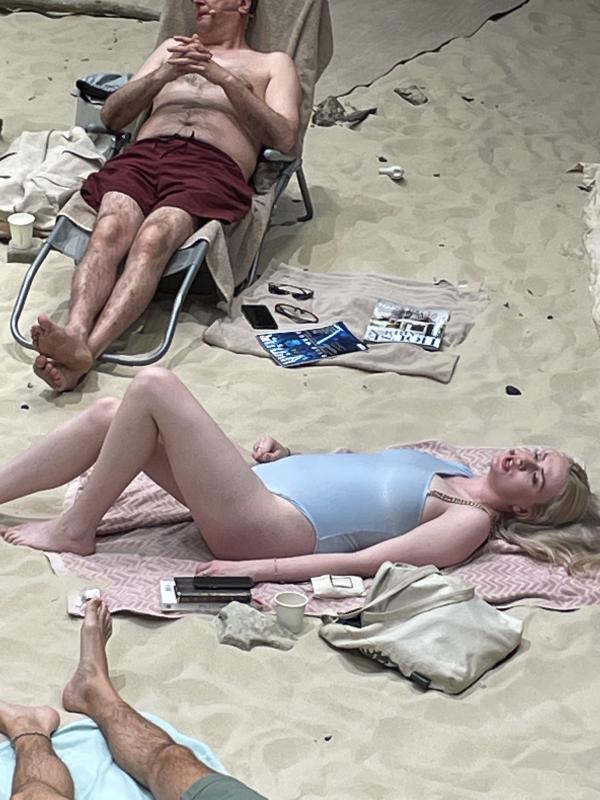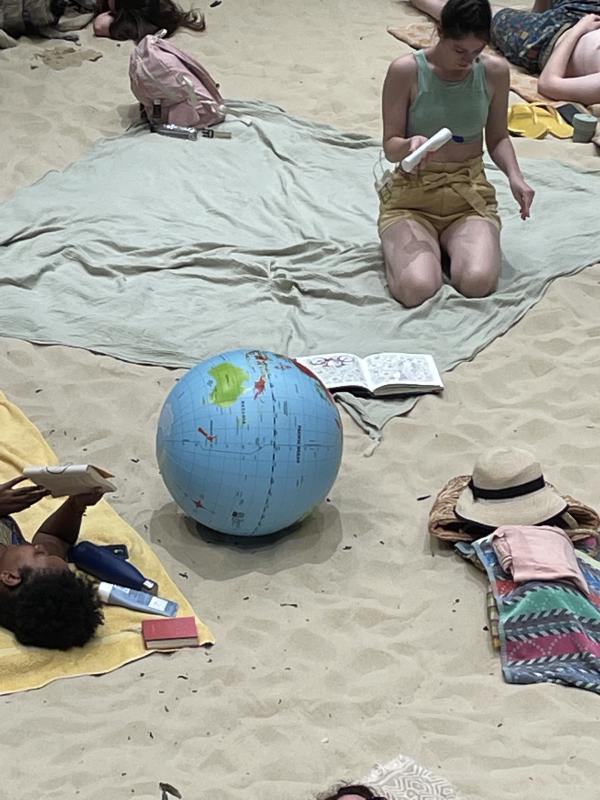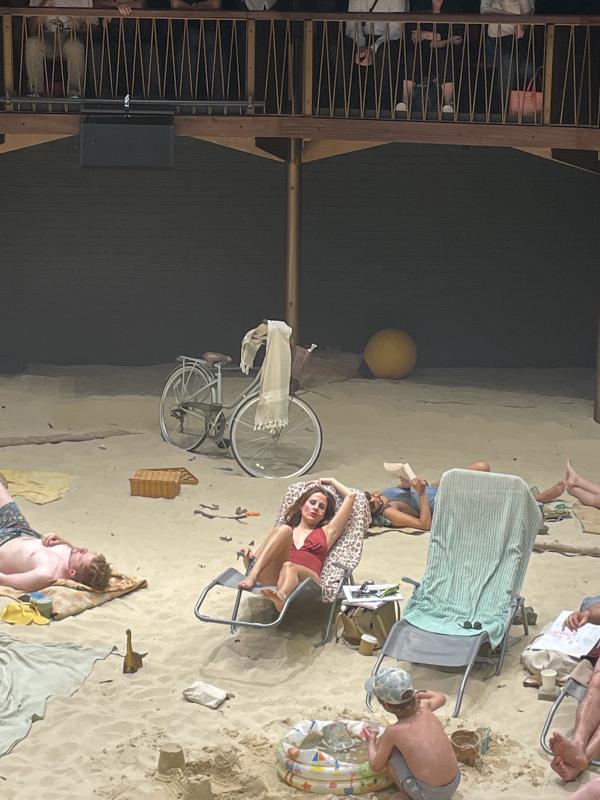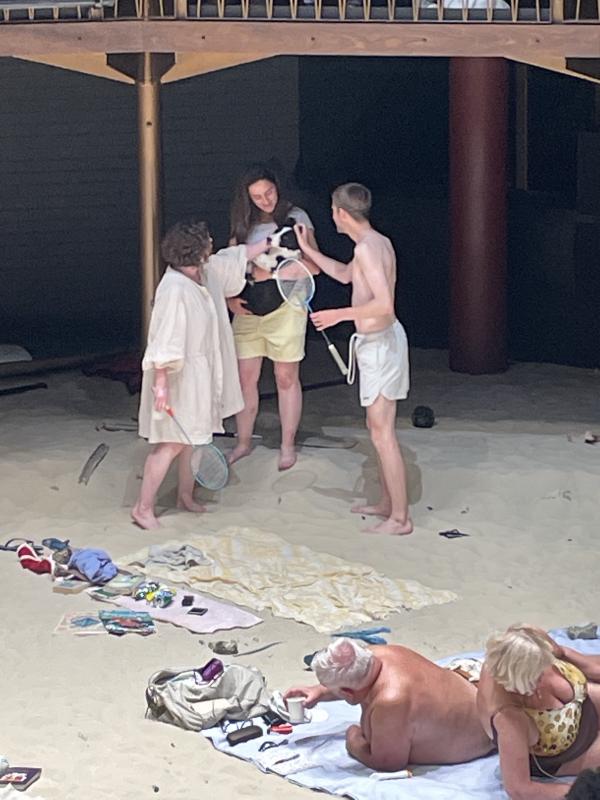Sun & Sea @ the Albany
ZM
Emoji summary: 😎 🌞 🏖
I am writing to you from a heatwave. By the time you read this, even if you’re on time, the colour strip on apple weather will have calmed down from red to yellow. But read this and remember the stickiness of the moment.
They say the human body starts to disintegrate in 41C heat. It begins to shut down - not that I know what that means. But I have seen this information plastered all over instagram like urban legend / chain email. Pass this information to 5 people before midnight or Greta Thunberg will appear behind you in a mirror and [XXX climatological disaster]. The asphalt on roads starts to melt, railways buckle. At 50C, the cells in a human body begin to deteriorate. In cities, the concrete and brick holds onto heat from the day. At night they glow with this warmth. How does a cell deteriorate? What happens to it (to me)? The blood-brain barrier breaks down in extreme heat. Apparently the protein in the cell breaks down, so I guess it literally just falls apart like wet tissue.
Ice melts in my cup. I raise my head to the sky. It is impossible. One day the clouds might disintegrate above me (like wet tissue, like protein in a cell). Meanwhile I dream of holidays and orange calippos and waterparks and Fanta lemon and the smell of aerosol spf on my arms and legs. The planetary: the ocean is experiencing heat extremes. But I want to be at the beach with saltwater waves in my hair, tan lines along the crease of my thigh where my wet bikini bottoms cling to skin, sandy kisses, sweat.
Kanye West Presents Good Music Cruel Summer. Creepers is playing and the world is on fire as the boys rev their engines down the high road. Tinted windows rolled down, they wait for me at the zebra crossing, bass pulsing through thick air. The air in The Albany is thick with heat too, a skintight atmosphere. I am here to see Sun & Sea. It has been billed as an opera about climate change and I think that sounds like a weird, surreal thing. The stage is lit bright and warm. A circle of sprawling sand, I look down on it from the darkened balcony that runs round the circumference. We, the audience, are gathered at the railings to peer down at the bodies already below: sunbathers and beach bums and people on holiday.
There’s no moment where the curtains come up, the music was already playing as we walked in (like a honky-tonk piano, tinny muzak backing track). They don’t feel like performers so it takes me a few minutes to spot the mic packs and headsets. But a blonde woman in an ice blue velvet swimsuit and pink lipstick starts singing. She is reclining on a zigzag beach towel, legs propped up in a triangle so her lower back can rest flat against the sand. Her voice is sharp and soaring, it surprises me. She is singing about her ex-husband who drowned in South East Asia, he was a good swimmer but he swam out too far beyond the shore, maybe he had cramp… Everyone sings together in chorus, slow and steady against the sand. You are strongly advised to stay on shore, you should not leave your children unobserved! Just build castles in the sand, walk the beach collecting stones, shells, amber, and baby teeth!…
A dog bounces over a strewn towel, interrupts a game of badminton. A couple wearing sunglasses are reclining on a large blue blanket, they hold hands lazily, sweetly. A young woman is reading Weather by Jenny Offill. Her partner leaves the stage only to return wet, drying his hair with a towel. Suncream and flip flops. A box of grapes (mixed half and half, red and white). A child kicks an inflatable globe, he interrupts a woman in a sarong who is calmly knitting. 3 besties laugh and play cards, eat meal deal salads and tap away on their phones. There is a plastic dinosaur figurine, I think it’s a Brontosaurus? Its stubby legs have been pushed into the sand.
A woman in a wine red swimsuit, the ends of her bouncy blow dry curl across the plunging neckline. She is laid out on a sun lounger, her expensive leather tote bag is stuffed full of home and interior design magazines. My boy is eight and a half and he has been swimming in The Black, The Yellow, The White, The Red, The Mediterranean, Aegean seas… Two weeks ago, my husband took me diving in Australia. We explored the coral forests, we climbed through their branches. What a relief that the Great Barrier Reef has a restaurant and hotel! We sat down to sip our piña coladas - included in the price! They taste better under the water, simply a paradise!
The couple holding hands are now singing to each other. They are so sweet, so definitely in love! One of them sings about how they met: when a volcano erupted unexpectedly, he stayed with a friend for a few days. And from that day on, Lucas and I have never been apart. Not a single climatologist predicted a scenario like this. Before it reached the airport, the airplane was caught up in the black cloud. When ashes are drawn into the hot engine, they become glass. Ashes, aeroplanes, ashes, aeroplanes, ashes, aeroplanes…
The opera is ambivalent. But the sea is no longer our glittering mutual friend. The loss is expressed but there is no room for lamentation. There is no grief. Maybe it’s me? Because I cannot experience climate grief, no matter how hard I try. I am numb even though the sun is so hot and even though my grandfather’s village will be underwater in 10 years. The chorus sing together again. Rose-coloured dresses flutter: jellyfish dance along in pairs - with emerald-coloured bags, bottles and red bottle-caps. O the sea has never had so much colour! I cycle through ambivalence myself.
Maybe another critic would make more of the way this performance functions as a work of theatre. They would gush: it is so clever, a cycling melody that spills out of itself, offering a view of something on a planetary scale by peeping into the interior lives of these random strangers on the beach, their silly little fictional lives blown up like a panoramic shot on a postcard. We, the audience, peer down at the performers like they are in an enclosure at the zoo. The stage is a vitrine containing curiosities of a time gone by and we disappear into the story. But there is a rippling undercurrent and we experience it without really realising. Maybe Sun & Sea is important because it historicises? It is documentation for a time when the beaches are fried and the fish are all belly up on the sand, salt crusted and rotting in the acid rain. Maybe one day the beach and the sun and the sea will all be mythological fiction, a story we tell kids about like ~back in my day~ or Henry the eighth.
All I know is, art often makes a heavy mess of things that are important. Art is not a format that can handle the didactic form - at least it can’t handle it with dexterity or deftness. It is not nimble enough, it cannot sneak through the cracks in understanding or fly below the radar. Art can feel like a blunt instrument. But, the opera is ambivalent. It takes climate change as subject, neutral. It is art in response, where the climatological is a material or a setting it can play out against (it already is, but I guess Sun & Sea just makes obvious what is already happening).
The last time I was on holiday, I lay stomach down on the beach to read Daisy Hildyard’s the Second Body. Every living thing has two bodies; a physical body that exists in real animal flesh and blood, and a networked global body. It is like a metaphor for impact but it is also a measurable and actual thing. Our second bodies are in the rising tides and the bleaching corals, the heatwaves and the droughts and the migration patterns of birds. I cried on the beach, teardrops rolling down my chest and onto the sand. I waded into the water up to my collarbones so the wet would hide the tear streaks down my bikini top. I waited until I was alone and distant from the crowd. I pissed in the sea and swam back to land, leaving this gift - global, planetary, networked. It made me feel better. The current would sweep the minerals and salts in my piss out to the deep. A particle of my piss could end up off the coast of Indonesia, in the Bay of Bengal, Balearic island archipelago or the Gibraltar straight where people swim from one continent to another. It could pass through the bodies of whales and hammerhead sharks, just as it passed through me. If it bleached corals, at least it would be singular - me alone. But more likely, it would draw a line for my networked global second body to follow.
(My bikini joins my second body when I wash it, the microplastics make their way back into the ocean without my animal body to wear them. But I cannot hold that kind of responsibility without buckling into myself at the scale of it all. I cannot comprehend it in its entirety so I must recycle my plastic and cardboard while remaining ambivalent.)
